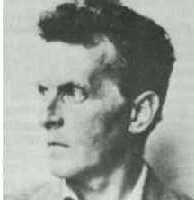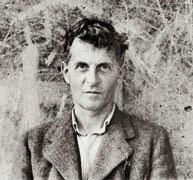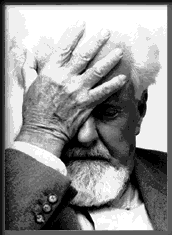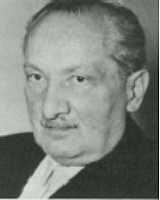![]()
 Ludwig
Josef Joh. Wittgenstein
Ludwig
Josef Joh. Wittgenstein
He studied (1912-13) at Cambridge Univ. under Bertrand Russell. In Vienna in the 1920s he came in contact with adherents of Logical positivism; they were profoundly influenced by his first major work, the Tractatus Logico-philosophicus (1921), which posits a close, formal relationship between language, thought, and the world. Language and thought work literally like a picture of the real world, and to understand any sentence one must grasp the reference of its constituents, both to each other and to the real. Language, however, can indicate an area beyond itself; unsayable things (e.g., things not demonstrable) do exist, and sentences whose structure of meaning amounts to nonsense can result in philosophical insight. Thus Wittgenstein, unlike the logical positivists, allowed for the possibility of a metaphysics. He returned to Cambridge in 1929, and his philosophy entered a second phase, represented by Philosophical Investigations (1953). Revising his earlier analysis of language, he now saw language as a response to, as well as a reproduction of, the real. His work greatly influenced what has come to be called ordinary-language philosophy, which maintains that all philosophical problems arise from the illusions created by the ambiguities of language.
 Quotations:
Quotations:
Knowledge is in the end based on acknowledgement.
On Certainty, sct. 378 (ed. by Anscombe and von Wright, 1969).
For a large class of cases-though not for all-in which we employ
the word "meaning" it can be defined thus: the meaning of a word is
its use in the language.
Philosophical Investigations, pt. 1, sct. 43 (1953).
Our greatest stupidities may be very wise.
Culture and Value (ed. by G. H. von Wright and Heikki Nyman,
1980).
Nothing is so difficult as not deceiving oneself.
Culture and Value (ed. by G. H. von Wright with Heikki Nyman, 1980),
1938 entry.
Someone who knows too much finds it hard not to lie.
Culture and Value (ed. by G. H. von Wright and Heikki Nyman,
1980).
Never stay up on the barren heights of cleverness, but come down
into the green valleys of silliness.
Culture and Value (ed. by G. H. von Wright with Heikki Nyman,
1980).
 Francis
BACON (1561-1626)
Francis
BACON (1561-1626)
speaker in Parliament, a lawyer, lord chancellor of England
As a philosopher and writer, Bacon attempted to explain the
principles of acquiring knowledge. He neglected the role of
mathematics in science, but advised students of nature to follow the
rule that whatever the mind seizes and dwells upon with particular
satisfaction is to be held in suspicion." He felt deeply that science
held the key to technological progress.
Thomas Hobbes (1588-1679)
English philosopher. Hobbes developed a materialist and highly
pessimistic philosophy that was denounced in his own day and later,
but has had a continuing influence on Western political thought.
His Leviathan (1651) presents a bleak picture of human beings
in the state of nature, where life is "nasty, brutish, and short."
Fear of violent death is the principal motive that causes people to
create a state by contracting to surrender their natural rights and
to submit to the absolute authority of a sovereign. Although the
power of the sovereign derived originally from the people, Hobbes
said the sovereign's power is absolute and not subject to review by
either subjects or ecclesiastical powers. Hobbes's concept of the
social contract led to investigations by other political
theorists, notably LOCKE, SPINOZA, and J.J. ROUSSEAU,
who formulated their own radically different theories of the social
contract.
Sir Karl Raimund Popper (1902-1992)
taught in secondary schools in Vienna, taught philosophy at
Canterbury University College (New Zealand), headed the department of
philosophy, logic, and scientific method at the London School of
Economics in England.
Popper viewed knowledge as an individual, unpredictable act of genius
not limited to verifiable statements. Originator of the theory of
falsifiability, Karl Popper is best known for his rejection of the
inductive method
of reasoning in the empirical sciences. In opposing this viewpoint,
Popper insisted that hypotheses must be testable, and that the
right test for a scientific hypothesis is to look for some
circumstance for which it does not hold. If no such circumstance can
be found, then the hypothesis is true.
His studies of the philosophical and political consequences of work
in the sciences and what he called the pseudo-sciences (e.g.,
psychology) and his attacks on historicism (the view that there are
historical laws) as a tool of totalitarian thought are presented in
The Logic of Scientific Discovery (1931) and The Open Society and Its
Enemies (1945). His later works include Objective Knowledge (1972)
and The Self and Its Brain (with J.C. Eccles; 1977).
Wilhelm Dilthey (1833-1911)
German philosopher. A strict proponent of empiricism,
Dilthey based what he called his "philosophy of life" on a foundation
of descriptive and analytical psychology. He rejected
transcendental considerations in his study of all aspects of human
activity. His influence on early sociological theory is especially
evident in the works of Max Weber. Dilthey's major work is
"Einleitung in die Geisteswissenschaften" (1883).
 Max
Weber (1864-1920)
Max
Weber (1864-1920)
German sociologist and political economist who greatly influenced
sociological theory. His concept of "ideal types," or
generalized models of real situations, provided a basis for comparing
societies. Opposing the Marxian view of the pre-eminence of economic
causation, he emphasized the role of religious values, ideologies,
and charismatic leaders in shaping societies. His famous
"Protestant Ethic and the Spirit of Capitalism" (1904-5) related
Calvinist ideals to the rise of capitalism. He influenced
sociological theory and tried to gain respect for sociology as a
discipline by defining a value-free methodology for it.
 Immanuel
Kant (1724-1804)
Immanuel
Kant (1724-1804)
He created a link between the idealists those who thought that all
reality was in the mindand the materialists those who thought that
the only reality lay in the things of the material world. Kant's
ideas on the relationship of mind and matter provide the key
to understanding the writings of many 20th-century philosophers. He
tried to set up the difference between things of the outside world
and actions of the mind. He said that things that exist in the world
are real, but the human mind is needed to give them order and form
and to see the relationships between them. Only the mind can surround
them with space and time. For example, we see only one or two walls
of a house at any one time. The mind gathers up these sense
impressions of individual walls and mentally builds a complete house.
Thus the whole house is being created in the mind while our eyes see
only a part of the whole. Kant said that thoughts must be based on
real things. Pure reason without reference to the outside world
is impossible. We know only what we first gather up with our senses.
Yet living in the real world does not mean that ideals should be
abandoned.
In his Kritik der praktischen Vernunft' (1788) he argued for a stern
morality. His basic idea was in the form of a Categorical
Imperative. This meant that humans should act so well that their
conduct could give rise to a universal law.
More about Kant and his Transcendental
Philosophy!
"Aufklärung ist der Ausgang des Menschen aus seiner selbst verschuldeten Unmündigkeit. Unmündigkeit ist das Unvermögen, sich seines Verstandes ohne Leitung eines anderen zu bedienen. Selbstverschuldet ist diese Unmündigkeit, wenn die Ursache derselben nicht am Mangel des Verstandes, sondern der Entschließung und des Mutes liegt, sich seiner ohne Leitung eines anderen zu bedienen. Sapere aude! Habe Mut, dich deines eigenen Verstandes zu bedienen! ist also der Wahlspruch der Aufklärung". (aus: BEANTWORTUNG DER FRAGE: WAS IST AUFKLÄRUNG?)
Und was tat Kant, wenn er keine Worte fand? Hier Ein Erlebnis Kants von Robert J. Gernhardt ;-)
 Konrad
Zacharias Lorenz (1903-1989)
Konrad
Zacharias Lorenz (1903-1989)© 1996 der Bilder by Brigitte Zaczek (http://www.spinnst.co.at/BZ/)
This study requires reflection on the content of the mind to the
exclusion of everything else.
Husserl called this type of reflection the phenomenological
reduction. Because the mind can be directed toward nonexistent as
well as real objects, Husserl noted that phenomenological reflection
does not presuppose that anything exists, but rather amounts to a
"bracketing of existence,", that is, setting aside the question of
the real existence of the contemplated object.
What Husserl discovered when he contemplated the content of his mind
were such acts as remembering, desiring, and perceiving and the
abstract content of these acts, which Husserl called meanings.
These meanings, he claimed, enabled an act to be directed toward an
object under a certain aspect; and such directedness, called
intentionality, he held to be the essence of
consciousness.
All phenomenologists follow Husserl in attempting to use pure
description. Thus, they all subscribe to Husserl's slogan "To the
things themselves". They differ among themselves, however, as to
whether the phenomenological reduction can be performed, and as to
what is manifest to the philosopher giving a pure description of
experience.
More about Husserl and
Phenomenology!
 Martin
Heidegger
Martin
Heidegger